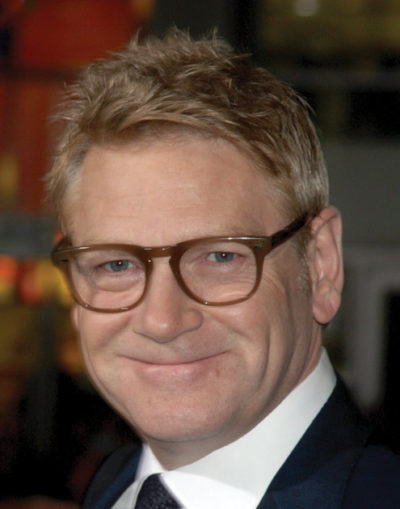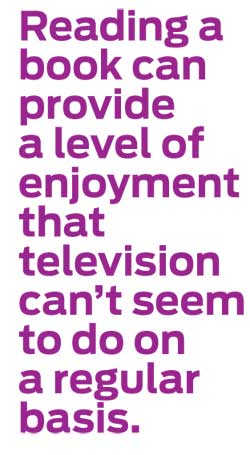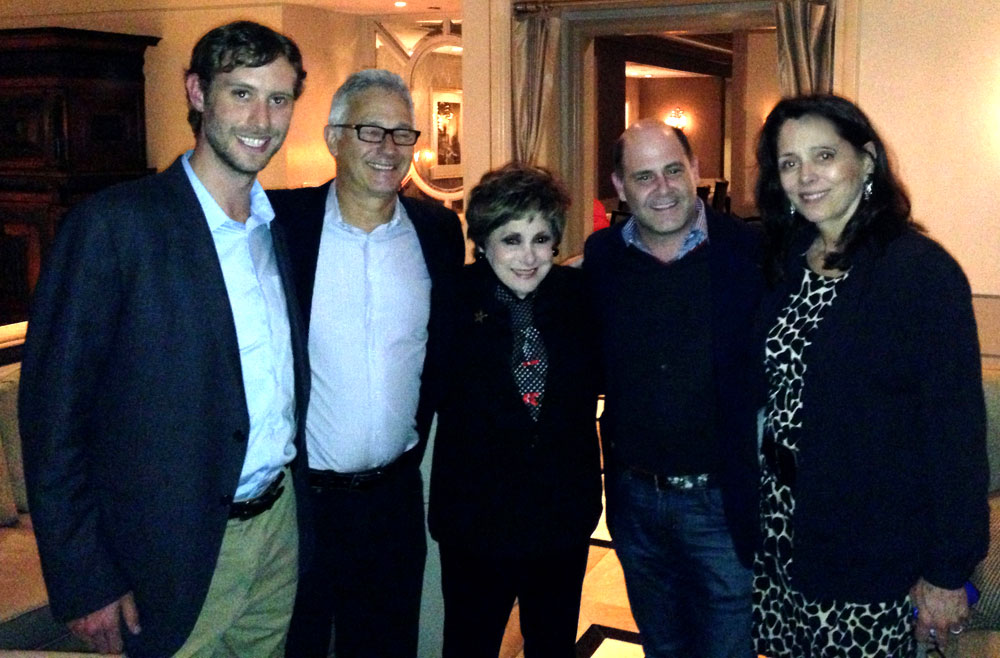An Interview with Kenneth Branagh

Sir Kenneth Branagh soared to fame as a Shakespearean actor who has directed and starred in most of the Bard’s classics, from Hamlet to Richard III, on both stage and screen. But he’s not above going for the mainstream, even stepping behind the camera to direct the comic-book action flick Thor.
This winter, he took on the role of the beloved sleuth Hercule Poirot while also directing Murder on the Orient Express (Now available on digital, 4K Ultra HD, Blu-ray and DVD.) One of his biggest challenges was negotiating Poirot’s enormous mustache, which, he says, “was the enemy of all food, so I became a soup-with-a-straw martyr.” Branagh also co-starred as British naval admiral Commander Bolton in Dunkirk and says the role reminded him of his father. “He had a sort of stoicism that is in the British character, where the cardinal sin is to make a fuss or be over-emotional.”
As irrepressible and charming as ever, Branagh seeks variety, and even after years of acting, writing, directing, and producing, declares, “I love good stories, so I’m the perfect audience.”
Jeanne Wolf: Multitasking is not a grand enough term for all you do. How do you pull off juggling so many jobs?
Kenneth Branagh: I tell myself that Shakespeare ran his own theater. He had to look at the balance sheets and write the plays. I have taught myself to clear things away and think about where I am at the moment. I am forced to focus on what I’m doing then. Perversely, I got a chance to be more immersed in my preparation for Hercule Poirot because I had to be so ready to welcome a bunch of famous movie stars and direct them. This is how it happened on the first morning: I open the door, and in come Michelle Pfieffer, Willem Dafoe, Penelope Cruz, Derek Jacobi, Johnny Depp, and Judi Dench. They all walk past, and I’m kind of terrified because in a moment I’ll have to say something to them that gets them going. But at the same time, I’m saying to myself, “Ken, you have been here before. You’ve done your hours.” They say it takes about 10,000 hours of practice if you want to be really good at tennis or playing the piano, and it’s the same with performing. You’re excited about how to tell that story. It’s something about which you care. I think people see that because you can’t fake it. It’s not like, “I’ll get these people together and make a ton of money!”
As for playing Hercule Poirot, I’ve lived a professional life where I’ve done many parts that have been played by other people. There’s 33 Poirot novels, plenty of material for many actors to pull out their own characterizations. I know people are coming to see Poirot, and hopefully me, but it’s the part that counts, and I was privileged to play the part.
JW: You came from what people call “humble beginnings.” Could you have envisioned all the things that have happened to you?
KB: Time is a funny thing. At 16, I was waiting at the stage door to try and get Derek Jacobi’s autograph as he came out from having just played Hamlet. It feels like two minutes ago that I got off a plane in Los Angeles and went walking down to Rodeo Drive for the first time. I felt like I had landed on the moon! I got stopped by a cop for jaywalking across the street. Cut to 30 years later, and to be here making movies and having Shakespeare run through all of that experience is really quite something.
They say there’s an age that you feel you are for most of your life. You may look in the mirror and the truth confounds you. You know, it sounds silly, but I’ve always felt that I was 23. I’m 57 now and I still feel like I’m 23. I hope that if I get to be any older, I’ll always feel that. With 23 comes a certain sense of wow. How am I here? How am I talking to Jeanne Wolf again after all of these meetings over the years? But on the other hand, you can have those Hamlet-y moments, which I suspect more regularly happens in one’s early 30s. Suddenly, you’ve roared through your 20s, when anything’s possible. You see the great career, or the great life that you want, and you’re suddenly thinking, “I can just begin to hear the sound of a clock ticking.” I realize I’m not here forever.
JW: You still seem to be getting a kick out of life and work. Is this still a thrill for you?
KB: I remember a great man was once asked about what the secret of life was. And he said, “Be cheerful.” That sounds trite and banal but, actually, it kind of works in almost everything, however perplexing and challenging the situation is. We’ve got the moment we live in and we can choose to have a twinkle in our eye even when we’re dealing with deprivation and pain. That’s what I try to do, even if it just reminds me to pull myself out of some sort of self-regarding moment.
You have to realize you’re a beggar, which is very much in the Shakespearean tradition. You’re hoping people might like what you do, and if they don’t, sometimes that’s pretty hard. Whatever the ups and the downs, you have to enjoy it for the kind of passing parade that you are part of. I think when you’re a little bit older, you learn to sort of relish it. Life is kind of like flying through turbulence: You’re up there soaring and you’ve got to be ready for the bumps.
Watch Jeanne Wolf’s interview with Kenneth Branagh here. An abridged version of this interview appears in the March/April 2018 issue of The Saturday Evening Post. Subscribe to the magazine for more art, inspiring stories, fiction, humor, and features from our archives.
Jeanne Wolf is the Post’s West Coast editor.
3 Questions for Alex Trebek
In 2014, Alex Trebek eclipsed the Guinness record for hosting a game show with his 6,829th appearance. He’s been coming into our living rooms for over three decades. No wonder we think we know the handsome, debonair, and sometimes intimidating host of Jeopardy! The show brought him fame along with an impressive collection of awards, including four Emmys. Off screen, Trebek has found a different kind of enduring success in his marriage to his second wife, Jean, who is a trained spiritual counselor. Two kids and 25 years together seem to have provided the couple’s correct answers.
I’ve known Alex for a long time and while I love to watch him lead contestants through their paces, I’ve seen sides of him other than the persona he projects on TV. That’s probably because, as he told me, “the trick for success for shows like mine is don’t get in the way of the game or the contestants. The focus must never be on you, or the audience will turn against you.”
Jeanne Wolf: What should fans of Jeopardy! know about off-the-set Alex?
Alex Trebek: I’m not going to dispel the notion of viewers that I am this brilliant human being. But the truth is, if I were a contestant I could never get my hand on the button in time. Maybe fans should know I like to fix things around the house when they break and I shop at Home Depot. They should know I am highly competitive, but more with myself than others. I’m always trying to better myself. I try to read more. When I was a kid, I would read and get so excited I just couldn’t wait to get to the next page. Reading a book can provide a level of enjoyment that television can’t seem to do on a regular basis.
JW: On Jeopardy!, you literally hold the answers. Were there times bringing up your son and daughter when you wished you had a pack of cards with the answers to how to be a good parent?
 AT: No, I didn’t run into that. My kids figured that dad would know the answer, and most of the time I did.
AT: No, I didn’t run into that. My kids figured that dad would know the answer, and most of the time I did.
JW: You speak with great admiration about your wife, Jean. What makes you thrive as a couple?
AT: Viewers of the show have told me that over the past 20 years I have mellowed as a host. My wife has helped to soften me. I try to be more understanding when players make mistakes, to ease the blow for them. I think that’s the main change that my wife has brought about in me. She’s more in tune with the spiritual side of our personalities. I’m not. She says I am, but I deny it. People ask me what guides me. There’s an old saying, I think it’s by Goethe, “If you can dream it, do it, because there is power and glory in doing.” I think that’s it. Dream all you want, but get off your duff and make the effort. Otherwise you could wind up regretting, and no one likes regret. Take a chance and do it. What’s the worst that could happen to you?
Saturday Evening Post Staff Visits with Mad Men’s Matt Weiner
In a recent trip to Los Angeles, The Saturday Evening Post’s executive team and entertainment journalist Jeanne Wolf met with Mad Men creator Matt Weiner to discuss his recent profile in the publication. In the article, Weiner, interviewed by Hollywood legend Jeanne Wolf, detailed his rise from wannabe scriptwriter who couldn’t get a nibble of interest in his Mad Men pilot show to runner of one of the most influential series of recent memory. At the gathering, he described his upcoming film project, You Are Here, starring Zach Galifianakis, Owen Wilson, and Amy Poehler.
Don’t miss: Wolf’s exclusive interview with Weiner.
